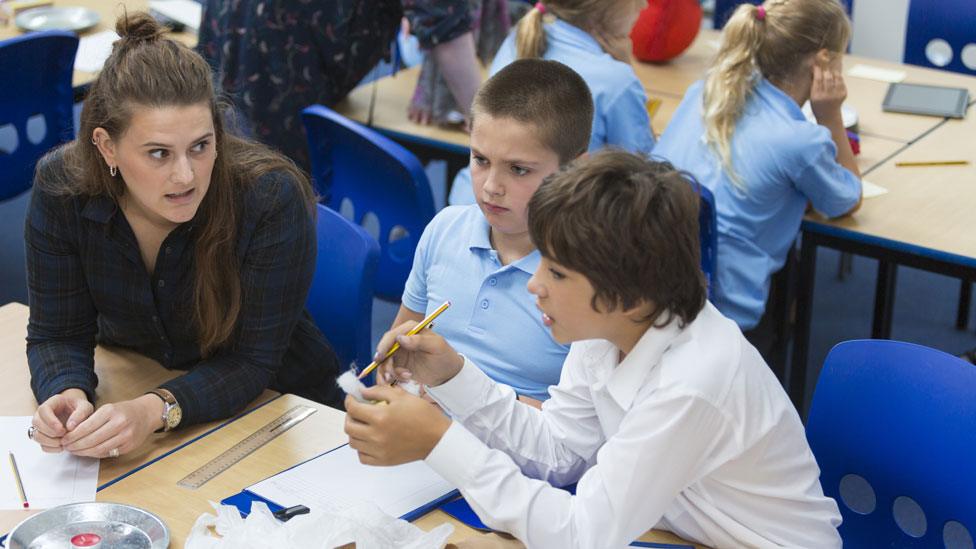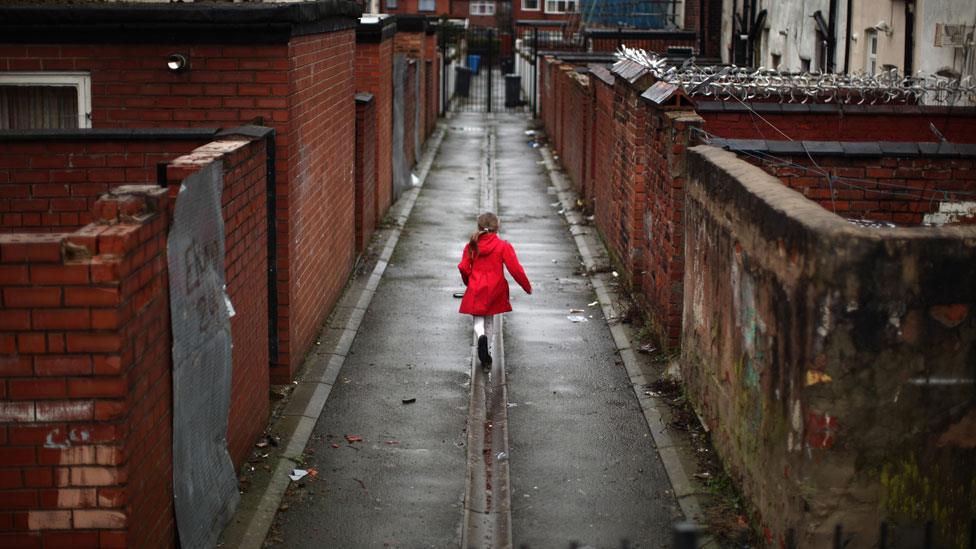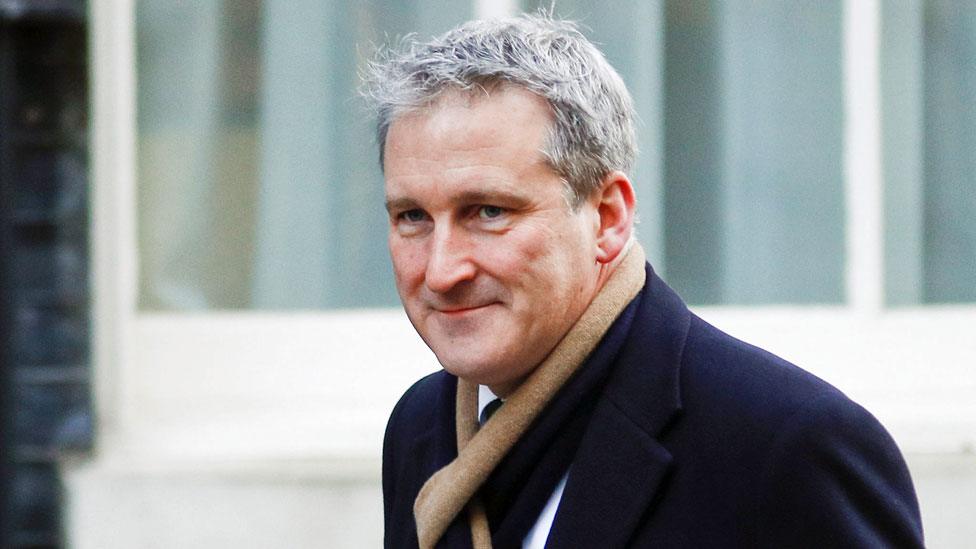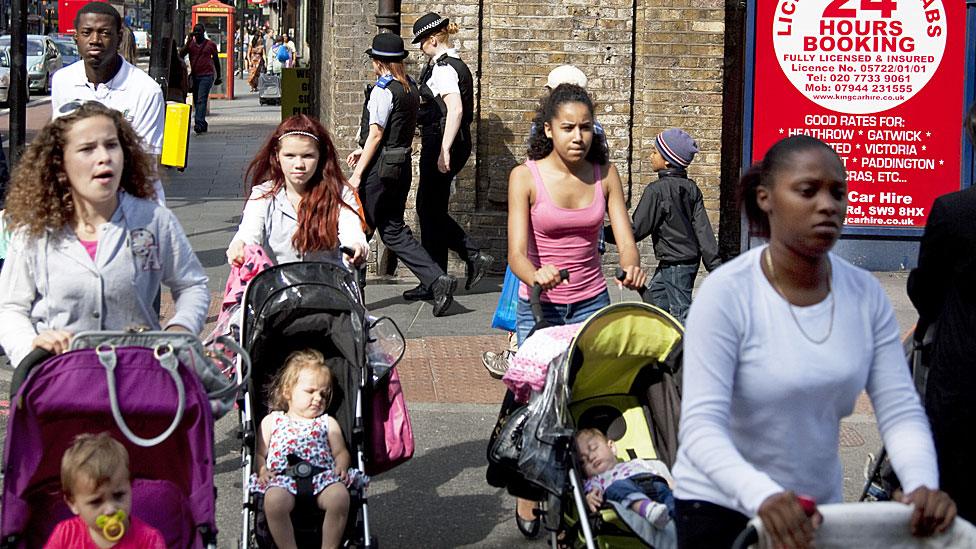'Pupil poverty' pressure on school cash
- Published
- comments

Heads say schools are having to act like an "emergency service" for impoverished families
Schools in England are having to "pick up the pieces" for families in poverty, including giving food and clothes to children, head teachers warn.
But, they say, that is unsustainable when schools are facing "funding cuts".
Heads will raise their concerns at the Association of School and College Leaders' (ASCL) annual conference.
Education Secretary Damian Hinds will tell the conference he is setting up an expert advisory group to help teachers with "the pressures of the job".
The advisory group, including the mental health charity Mind and teachers' representatives, will look at ways to improve wellbeing among teachers and to tackle stress.
Providing shoes as well as lessons
But the head teachers' conference in Birmingham will hear complaints that pressure in school is being exacerbated by inadequate levels of funding.
Many schools face "severe cuts", says ASCL general secretary Geoff Barton, but they are still expected to be an "unofficial fourth emergency service for poor and vulnerable children".

Head teachers have been protesting against budget shortages in schools
"A decade of austerity has wreaked havoc with the social fabric of the nation and schools have been left to pick up the pieces," says Mr Barton.
He accuses politicians of having a "fixation with Brexit" while failing to address the struggles of impoverished families and the lack of investment in schools.
Sarah Bone, head teacher of Headlands School, in Bridlington, says she sees "too many children with no heating in the home, no food in the cupboards, washing themselves with cold water, walking to school with holes in their shoes and trousers that are ill fitted".

Heads say funding problems for schools add to the pressure on teachers
Edward Conway, head of St Michael's Catholic High School in Watford, says: "Pupil poverty has increased significantly over the past eight years, with us providing food, clothing, equipment and securing funds from charitable organisations to provide essential items such as beds and fridges."
Widening gap
The head teachers' union has canvassed the views of school leaders, whose comments include: "When schools have to buy shoes for children to wear to school on a regular basis, we must have a problem."
Another head said: "In 24 years of education, I have not seen the extent of poverty like this.
"Children are coming to school hungry, dirty and without the basics to set them up for life.
"The gap between those that have and those that do not is rising and is stark."

Head teachers have been campaigning over school budget shortages - with claims of fewer staff, bigger classes and teachers having to carry out support tasks, even cleaning the toilets.
Heads have linked this to problems recruiting teachers and to staff quitting their jobs.
The education secretary will tell the conference that he is creating a panel of experts to find ways to reduce stress and provide more support for teachers.
Reducing stress
"Like any really important job, teaching comes with its own challenges and, whilst rewarding, I don't need to tell you how stressful it can be," Mr Hinds will tell the conference.
"As a society, there is a much greater level of understanding about mental health and wellbeing and it is something many of you raise with me when I visit your schools.

Damian Hinds is setting up an advisory group to address stress and improve wellbeing among teachers
"Whilst those conversations are focused on supporting your students, I'm clear that your wellbeing is also something we need to prioritise."
Paul Farmer, chief executive of Mind, says: "Mental health problems at work are common in all workplaces - and although we have made great strides, mental health is still a taboo subject.
"The first, and arguably most important, step will be to start a conversation about mental health that empowers teachers and make sure they have access to the right training and guidance to support themselves, their colleagues and their students."
- Published8 March 2019

- Published15 June 2018

- Published16 March 2017
